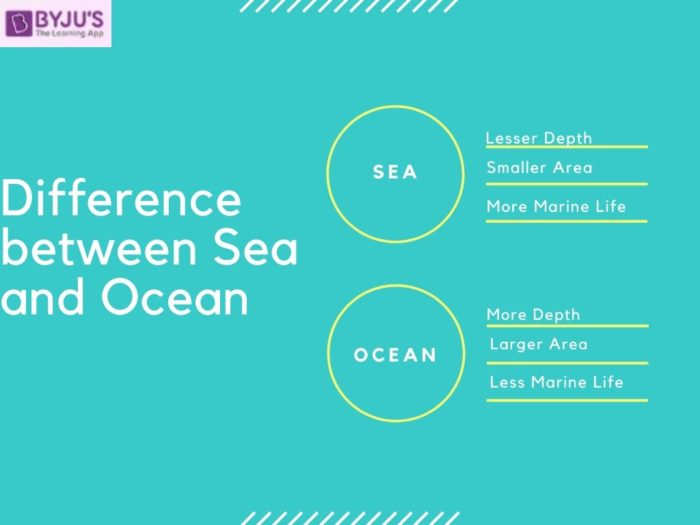Difference between Sea and Ocean is explained here in detail.
Sea provides substantial supplies of food for humans, mainly fish. Uses of the sea include trade, travel, mineral extraction, power generation, warfare, and various leisure activities.
An ocean is a body of water that composes much of a planet’s hydrosphere. The ocean contains the majority of Earth’s water. Oceans influence weather and climate patterns.
For information on IAS Exam dates, structure and other details aspirants can visit the given link.
Difference between Sea and Ocean – UPSC Notes:- Download PDF Here

Sea vs Ocean – Comparative Analysis
What Is the Sea?
The expanse of salt water that covers most of the Earth’s surface and surrounds its land masses is called the Sea. Sea is that part of the ocean that is partially surrounded by land. However, there are cases where the sea is completely landlocked, for example, The Caspian Sea.
What Is the Ocean?
An ocean is a body of water that composes much of a planet’s hydrosphere. Over 70% of Earth’s surface is covered with oceans. There are five oceans in the world, the Pacific Ocean, the Atlantic Ocean, the Arctic Ocean, the Indian Ocean and the Antarctic ocean.
Difference Between Sea and Ocean
The major differences between Sea and Ocean are:
| Sea | Ocean |
| Sea is made up of salty water but is smaller in size compared to oceans. | Ocean covers approximately 70% of the earth’s total surface. The ocean is made up of salty water. |
| The largest sea is the Meditteranean Sea. The area of the Meditteranean sea is approximately 1.14 million square miles. | The largest Ocean is the Pacific Ocean with an area of approximately 60 million square miles. The smallest ocean is the Arctic Ocean covering an area of 5.4 million square miles. |
| Seas are usually located close to land. | Oceans are not necessarily located close to land. |
| Aquatic life exists in abundance in seas as seas are usually located close to the Land. | Oceans have reduced aquatic life as it is far away from the land and deeper than the Seas. |
| There is a large quantity of marine life in the Seas as sunlight is able to penetrate deeper into the seas, allowing photosynthesis. | The marine life in oceans is usually confined to bacteria, shrimp, microscopic planktons. This is due to the lack of penetration of sunlight deep into oceans, thus not giving much scope for photosynthesis. |
| Some of the major seas are Mediterranean Sea, Caribbean Sea, South China Sea, Black Sea etc. The deepest sea is the Caribbean Sea, with an approximate depth of 6900 metres. | The Deepest Ocean is Pacific Ocean which is around 10,000 metres deep and the Arctic Ocean is around 5600 metres deep. |
After understanding the differences between Sea and Ocean, visit the below given NCERT links for information on the other aspects of Oceans along with other related topics.
- NCERT Geography Notes: Ocean Floor and its Features
- NCERT Geography Notes: Salinity of Ocean Water
- NCERT Geography Notes: Ocean Waves
- NCERT Geography Notes for UPSC
- List of Major Straits of the World
- United Nations Convention on Law of the Sea (UNCLOS)
- World Geography through Maps
- South China Sea – Dispute, History and India’s Involvement
- Difference between Articles – Complete List (History,Geography,Polity and More)
Difference between Sea and Ocean – UPSC Notes:- Download PDF Here
Frequently Asked Questions on Difference Between Sea and Ocean
What is the main difference between ocean and sea?
What type of water do ocean bodies and seas contain?
What is the significance of the Sea and Oceans?
Given below are the benefits of Seas and Oceans:
-
- Sea and Ocean water is responsible for the functioning of the water cycle
- Regulation of climatic conditions
- Trade through water transportation
- The livelihood of marine species
What are the Seven Seas?
Are Seas a part of the ocean?
For a thorough understanding of the syllabus of Civil Services Exam, visit the given link UPSC Syllabus.
Related Links
| IAS Salary | Static GK |
| List of Union Ministers | Tributaries of Narmada |
| Exim Bank India | Economic Survey pdf |
| What is FATF | School Fitness Khelo India Programme |
Comments